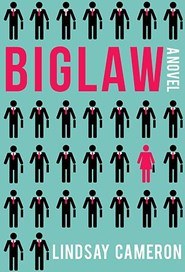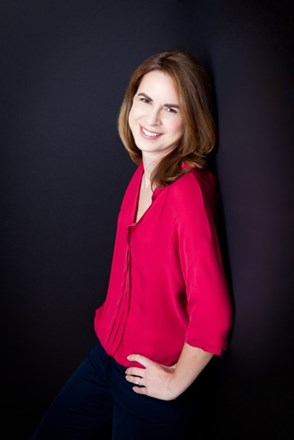5 Minutes With... Lindsay Cameron
 Firstly, congratulations on the success of your first novel, BIGLAW, which we really enjoyed. When did you decide to become a lawyer? Why?
Firstly, congratulations on the success of your first novel, BIGLAW, which we really enjoyed. When did you decide to become a lawyer? Why?
Thank you! I’m so glad to hear you enjoyed it. I think I decided to become a lawyer through a process of elimination. I enjoyed academics and had a good work ethic, but wasn’t a risk taker. So, I narrowed my career options down to medicine, engineering or law. I’m too squeamish for medicine, lacked the necessary skill set for engineering and that left law. So…law school here I come!
Who do you hope will read BIGLAW and what do you think they will get out of it?
I hope everyone will read it! I think the book gives readers a good sense of the rewarding, anxiety-provoking, maddening world of working in a large law firm and the sacrifices that go along with chasing the brass ring. For law students considering a career in Biglaw, I think it will either make them run in the opposite direction or allow them to go into that world eyes wide open.
Starting out, what did you expect from a career in the law?
I don’t think I knew what to expect. In my first week of law school when I was sitting on the steps contemplating if I’d made the right decision in my process of elimination, a retired dean of the law school came up to me and sat down. He pointed to a Latin phrase written over the front entrance to the building and explained the translation. “Let justice be done though the heavens fall.” I remember feeling proud that I was embarking on a noble profession.
“For law students considering a career in Biglaw, I think the book will either make them run in the opposite direction or allow them to go into that world eyes wide open.”
Why did you choose corporate law, specifically?
I enjoyed my corporate law classes and found the type of work corporate lawyers do more appealing, but there were also some practical reasons that made it the best choice for me. I started my career in Vancouver, but knew that I wanted to transition to New York at some point and there are far more international opportunities for Canadian corporate lawyers than there are for litigators trained in the Courts of Western Canada.
Mackenzie wishes at one point that “the classes I'd taken in school had been just a little more useful” to the realities of practicing law. Is there anything law students can be doing to better prepare themselves for life at a firm?
No professor ever drops a pile of contracts on your desk and asks you to summarize anything “relevant.” I think it would be helpful for law students to shadow a lawyer to get a sense of what the day-to-day experience of practicing law actually entails. Kind of like a “bring your daughter to work day” – Bring a Law Student to Work Day. Either that or they should start recording their daily activities in six-minute intervals to get used to billing. That could help too.
How were your own experiences of law school?
I loved law school. I made some of my best friends there and my classes were interesting. I knew it was my last three years of having a flexible schedule before hitting the real world, so I enjoyed it. Now, whether it prepared me for the practice of law is a different story!
 “No professor ever drops a pile of contracts on your desk and asks you to summarize anything 'relevant.'”
“No professor ever drops a pile of contracts on your desk and asks you to summarize anything 'relevant.'”
What achievement are you most proud of?
The career achievement I’m most proud of is finishing a novel with two children under the age of three. Thankfully, working in Biglaw made me accustomed to functioning with very little sleep!
What do you consider your greatest failure or regret?
My law school had a great exchange program that I wish I’d taken advantage of, but I was too Type A to deviate from the traditional path. If only I’d realized what a unique and wonderful opportunity it is to live and study in a foreign country – maybe then I’d know a second language!
What law would you change, abolish or create?
I’d create a law that would specifically limit the scope of the Second Amendment. That’s right, America, I’m coming for your guns! Or, better yet, I’d like to modify the Second Amendment to make it unambiguously conform to the intent of those who drafted it. I’m pretty sure they weren’t thinking about an individual right to own an assault rifle when they drafted it.
Who is your legal hero?
Without a doubt, Ruth Bader Ginsberg. The perfect lawyer, professor, judge (maybe human?) I don’t think it’s an exaggeration to say her commitment to human rights, and in particular gender equality, changed the American workplace and the lives of millions of women. Plus she dropped the biggest truth bomb when asked about women on the Supreme Court. “I’m sometimes asked when will there be enough? And I say ‘when there are nine.’ People are shocked. But there’d been nine men, and nobody’s ever raised a question about that.” Boom!
If you could go back in time to the start of your law career, what would you do differently?
I don’t think I’d do anything differently. There were a lot of highs and lows working in Biglaw, but ultimately it gave me great material for a novel.
"The book is decidedly fiction, it’s not a memoir, but there are characters and circumstances that are based on my own experience."
What were your best experiences working in Biglaw?
I was fortunate in my career to work on a number of high profile transactions and I loved the energy in the room during signing and closing. That feeling you get watching months of hard work and sacrifice finally come together and knowing that the deal you’re working on is shaping an industry is what corporate lawyers live for!
And your worst?
I don’t think I can pinpoint the worst, but it would probably involve being in my office at 3am, a plate of greasy Chinese food, a banker’s box full of documents and a message in my inbox informing me that the timeline for our transaction has been vastly accelerated.
To what extent did your real-life experiences in Biglaw feed into the fictional world of BIGLAW?
The book is decidedly fiction, it’s not a memoir, but there are characters and circumstances that are based on my own experience. I had the idea for the book while I was still working at a large law firm in New York, so I kept a notebook in my office to jot down my observations and thoughts. I used those notes as the basis for my novel – with some poetic license thrown in too, of course!
For any budding novelists out there, how did you set about getting BIGLAW published?
It wasn’t a quick and easy process. When I finished the first draft of the manuscript a good friend (and former colleague) put me in touch with a literary agent she knew. I was hoping she would give me some feedback, but I was blown away to get an email from her saying she loved it and wanted to represent me. My agent is a former Biglaw lawyer herself, so understood that world and totally got the book. Former Biglaw lawyers helping former Biglaw lawyers! We should start a club. After many, many revisions, my agent pitched the manuscript to publishers (more revisions) and found a good home for the novel with Ankerwycke Publishing. Then more revisions. Finally, it turned up on Barnes & Nobel! Have I mentioned the revisions?
“When more firms are willing to have more women in positions of management and leadership, more women will stay in the profession and ascend the ladder.”
In your experience, why do Biglaw firms generally have so few female partners?
I worked in a department without a single female partner. In my experience this is completely de-motivating for women. You don’t have a mentor and you see women who deserve to be partner pushed into stagnant career tracks. Why stick around for that? When more firms are willing to have more women in positions of management and leadership, more women will stay in the profession and ascend the ladder.
Can we look forward to BIGLAW: The Movie?
I hope so! The TV and Film rights have been optioned to Paramount, so I’m crossing my fingers we’ll see Mackenzie on the screen.
We'd love to find out what's next in store for Mackenzie. Will you write a sequel?
Maybe someday…
What prompted you to take the plunge and quit Biglaw? What were your plans at the time (and did they include writing?), and what would your advice be to others thinking of doing the same?
After I came up with the idea for the book and started recording my workplace observations in my notebook everyday, I was hooked. Writing in my notebook quickly became my favorite time of the day and I couldn’t ignore the fact that I enjoyed it more than any legal work I was doing. It took about a year of humming and hawing, and some encouragement/insistence from family, but eventually I took the leap and decided to leave Biglaw to write a novel. My advice for others would be to take the time to really give writing a try before you quit your day job!
Finally, would you ever go back to being a lawyer? If not, why not?
No – been there, done that!